|
Hi there,
This week, the Senate finally passed the third coronavirus relief package, otherwise known as the CARES Act. By passing this legislation, the federal government is providing immediate emergency relief for all Americans and West Virginians will benefit. The package gives financial assistance to Americans, provides relief to our small businesses and workers who have been affected, stabilizes our economy, and further supports our health care workers and patients.
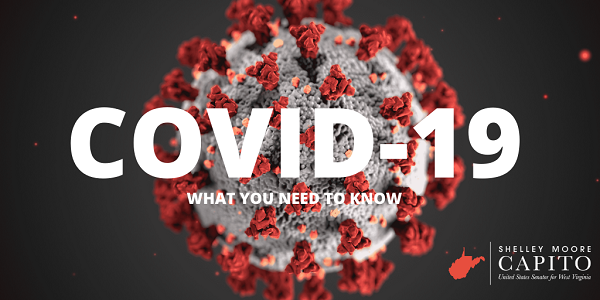
So, what are the specifics and how can this help West Virginians like you?
- Directs financial relief to middle-class families, with payments of $1,200 for individuals earning up to $75,000 per year or $2,400 per couple earning up to $150,000 per year plus $500 per child.
- Provides $350 billion in loans for small businesses to make payroll and pay rent and other bills. Portions of the loans spent on salary and certain other expenses can be forgiven.
- Includes an additional 13 weeks of unemployment for workers laid off due to the current economic crisis, and an additional $600 weekly unemployment benefit for four months.
- Makes significant loan funding and financial assistance available to industries of national importance, to maintain these industries and retain workers.
- Includes $100 billion for hospitals, community health centers, and other medical providers to address COVID related expenses and increase capacity.
- $20 billion for veterans’ health care programs.
- $16 billion for the Strategic National Stockpile to purchase more protective equipment, respirators, and other vital items.
- $45 billion for FEMA’s Disaster Recovery Fund along with increasing funds for FEMA grants that benefit local West Virginia localities and first responders, through my chairmanship of the Homeland Security Appropriations Subcommittee.
- $11 billion for vaccines, therapeutics, diagnostics, and other medical needs.
- $8.8 billion for child nutrition programs, nearly $16 billion for SNAP, and $450 million for food banks.
- $150 billion to help cover COVID expenditures of state and local governments, $1.25 billion of which will be allocated to West Virginia.
- $1.5 billion for Economic Development Administration (EDA) grants and $5 billion for Community Development Block Grants to states and communities.
- $10 billion for airports through the Airport Improvement Program.
- Tens of millions of dollars to improve connectivity for students, businesses and workers through the United States Department of Agriculture (USDA), the Federal Communications Commission (FCC), and the Department of Veterans Affairs (VA).
- Ensures Community Health Centers and Rural Health Clinics can provide telehealth services for to Medicare beneficiaries in their home during the COVID-19 emergency period.
- Pauses payments on federally owned student loans for 6 months without interest or penalties.
- Includes the Protecting Jessica Grubb's Legacy Act, which I introduced.
You can learn more in my interview on America’s Newsroom:
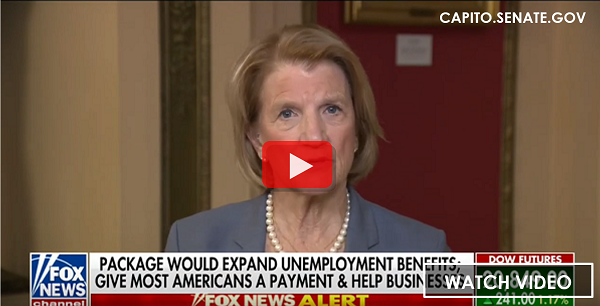
Find out more on what’s in the package here.
Other Efforts
Last week, I voted in favor of The Families First Coronavirus Response Act also known as “Phase Two” of the federal government’s coronavirus response. That bill, which President Trump signed into law, includes:
- FREE coronavirus testing.
- Paid sick leave.
- Family leave for caregivers.
- Food assistance for the needy.
- Enhanced unemployment insurance.
- Increased Medicaid funding for states.
Three weeks ago, President Donald Trump signed “Phase One” an $8.3 billion supplemental aid package that I also voted in favor of to help states treat, prevent, and prepare for the coronavirus. With this additional funding, our country is even more prepared to limit the spread of the coronavirus, test those showing symptoms, and treat those suffering.
West Virginia health centers are already receiving funding from these packages. Learn more here.
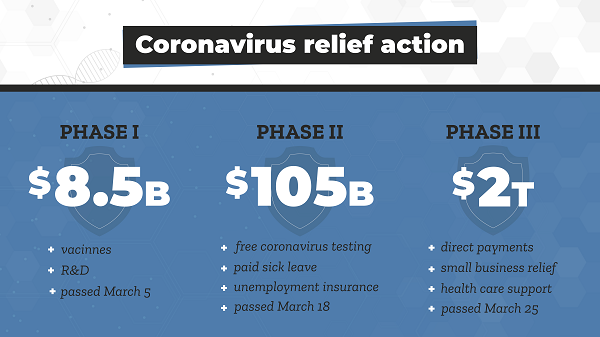
Working for West Virginia
First and foremost, my focus is to make sure our West Virginians remain healthy and safe. I’ve been in constant contact with officials at the federal and state level to check in, ask questions, address certain issues, and make sure they are prepared. As chairman of the Homeland Security Appropriations Subcommittee, I’m making a point to ask the agencies I fund if they are prepared and equipped with the necessary resources to combat, treat, and prevent the coronavirus.
Below are more details on my efforts:
- Communicated with West Virginia Department of Health and Human Resources (DHHR) Secretary Bill Crouch about the state’s testing issues.
- Spoke with West Virginia Hospital Association President and CEO Joe Letnaunchyn and West Virginia Health Care Association CEO Marty Wright.
- Voted in favor of a second emergency supplemental funding package to provide economic relief to individuals, small businesses, and families during the coronavirus (COVID-19) outbreak.
- Voted in favor of the third emergency supplemental funding package to provide immediate relief to West Virginians and others across the country that desperately need it.
- Attended a senators-only Health, Education, Labor, and Pensions (HELP) Committee briefing to ask questions directly of leadership from the Department of Health and Human Services (HHS), including the Centers for Disease Control and Prevention (CDC), the State Department, and the Department of Homeland Security (DHS).
- Spoke with West Virginia Governor Jim Justice about West Virginia’s preparedness and readiness.
- During two Homeland Security Appropriations subcommittee hearings:
- Been in constant contact with members of the Trump administration, including: FEMA, DHS, TSA, and ICE.
Additional Resources
I created a new page on my website with information and resources to keep you up-to-date on the coronavirus situation as it continues to evolve. Check out that page here, and please share with friends so they can keep up with the latest.
In addition to my webpage, I also want to make sure you know where to get the latest updates from the medical experts at CDC.gov and West Virginia DHHR.
I will continue doing my best to keep you up to speed on what we are doing here at the federal level to help and other resources that can be useful back at home. I will be posting regular updates on my Facebook and Twitter accounts, so be sure to follow me there.
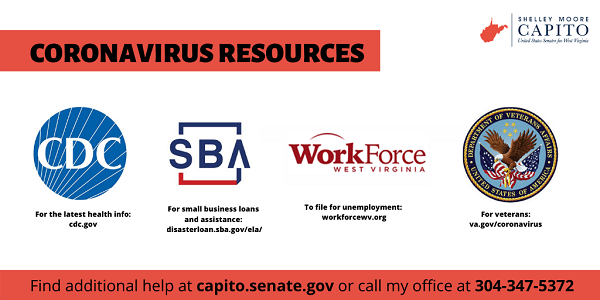
Important Information If You’re Visiting DC
Because of coronavirus concerns, all Capitol and White House tours have been suspended indefinitely. Please contact our Washington office to reschedule. Additionally, requests for flags flown over the Capitol may be delayed, and access to the Capitol and House and Senate office buildings is being restricted. Feel free to contact our office at (202) 224-6472 with any questions. We apologize for any inconvenience.
In Case You Missed It
This week, we also learned West Virginia is eligible to receive an additional $43 million through the State Opioid Response (SOR) grant program. The funding amount for each state is determined by several factors, including mortality ratesa change resulting from a measure I authored to prioritize funds for states hit hardest by the drug crisis. Without this language and based on previous formulas based on population, West Virginia would have received significantly less/
Learn more about the funding here.
How Can We Help?
Whether you need help with a casework issue or have a question about scheduling a meeting at one of my offices, my staff and I are ready to assist you. Learn more about the services we offer at www.capito.senate.gov.
You can also submit your feedback and share your stories with me by visiting my “Share Your Stories” webpage here: www.capito.senate.gov/ShareYourStories.
Social Media Recap
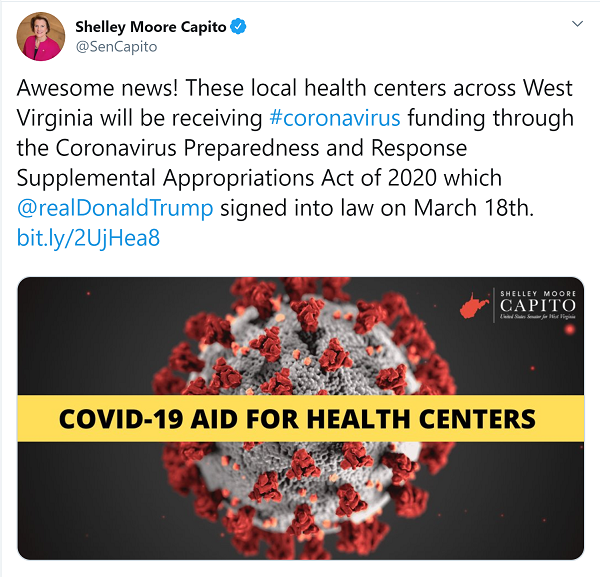
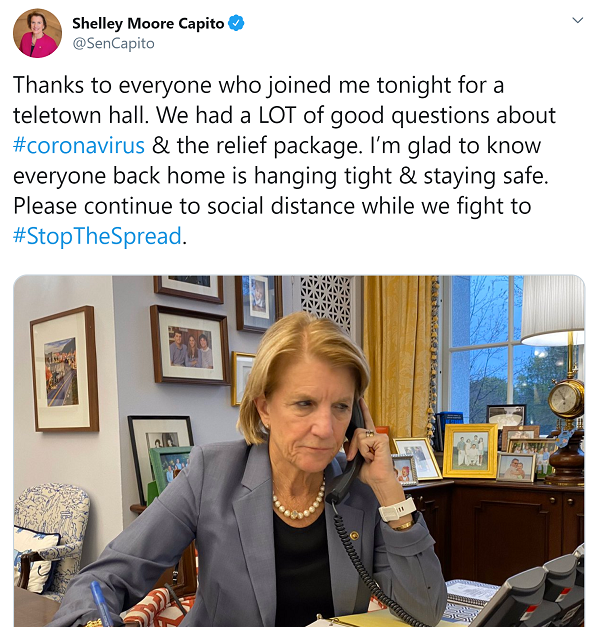
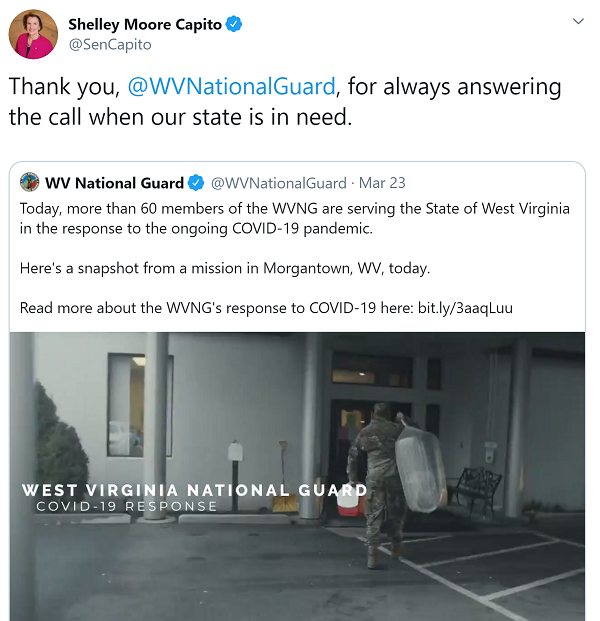
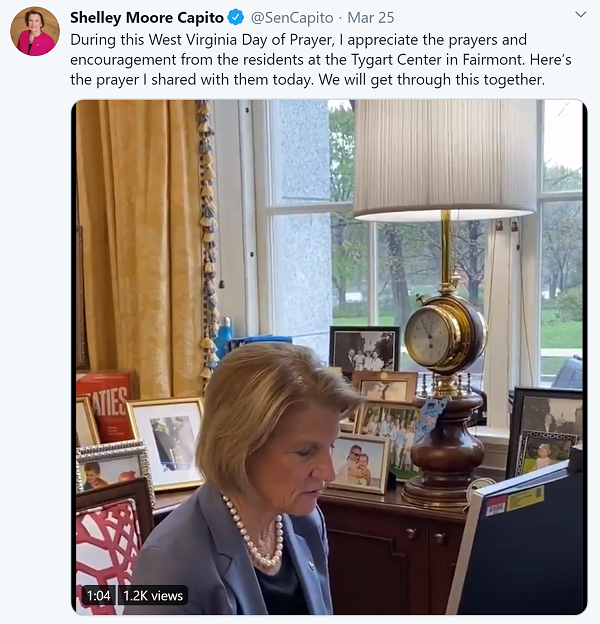
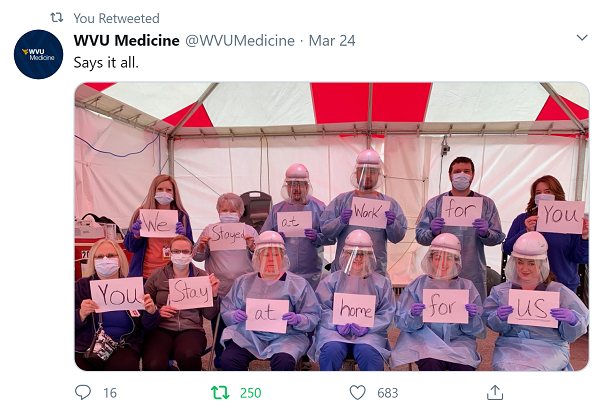
Join me on Facebook, Twitter, and Instagram for regular updates and photos.
Sincerely,

Shelley Moore Capito
United States Senator
|